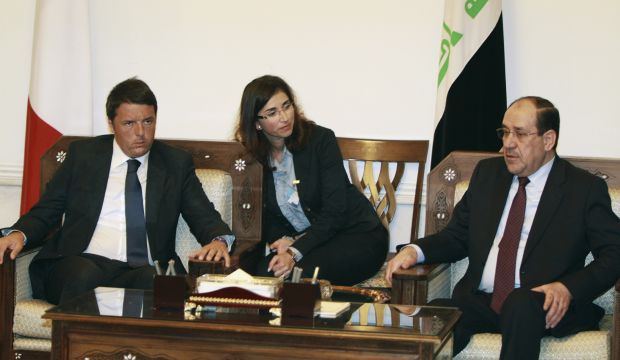
Iraq's former prime minister Nuri al-Maliki (R) speaks with Italy's Prime Minister Matteo Renzi (L) during their meeting in Baghdad August 20, 2014. (Reuters/Mahmoud Raouf Mahmoud)
Baghdad, Asharq Al-Awsat—Iraq’s outgoing Prime Minister Nuri Al-Maliki on Wednesday called on his successor to reject any “preconditions” in his attempt to form a government, prompting criticism from the political factions vying for positions in Iraq’s next cabinet.
In his weekly televised address, Maliki said: “Setting conditions before the formation of the government will damage the political process, and Prime Minister-designate Haider Al-Abadi must reject them.”
“Abadi must refuse to be dictated to by political blocs, and must avoid the preconditions until after the formation of the government before the constitutional deadline ends,” Maliki added.
Abadi was charged with forming a government two weeks ago, after months of unsuccessful attempts by Maliki to assemble a parliamentary coalition big enough to secure a third term in office.
Abdadi’s appointment was welcomed across Iraq and the region, with Maliki widely-blamed for alienating Iraq’s Sunnis, Kurds, and regional neighbors, and for failing to prevent militants from the Islamic State of Iraq and Syria (ISIS) seizing large swathes of northern and western Iraq, including its second-largest city, Mosul.
US President Barack Obama called Abadi’s appointment a “promising step forward,” and called on him to form a new government capable of reuniting Iraq’s different communities, including Sunnis and Kurds.
Issam Al-Obaidi, a leading figure of the Iraqi Forces Alliance–the Iraqi parliament’s Sunni bloc–told Asharq Al-Awsat that outgoing Prime Minister Nuri Al-Maliki “should stop offering Prime Minister-designate Haider Al-Abadi advice because Maliki’s advice will have a negative effect due to his negative experiences with everyone.”
He added: “We have become accustomed to Maliki’s discourse being divisive.”
Meanwhile, Kurdish ministers who had withdrawn from the federal government in protest at Maliki’s claims in June that the government of Iraq’s autonomous Kurdish region had been harboring ISIS militants have returned to work.
Iraqi Kurdistan Alliance MP Farhad Hassan told Asharq Al-Awsat: “The return of Kurdish ministers to the central government is a gesture of goodwill, because we see that the next government needs all parties and constituents, and therefore, there is no need for the continuation of the boycott.”
“What is important to us is reconciliation in order to form the government, because the previous experience was a failure for all, where the Erbil Agreement had 19 points, of which Maliki implemented not one,” he added.
Hassan said that the performance of Iraq’s next government would determine if the country would survive, and hit out at Maliki’s latest comments.
“The next four years will be decisive and pivotal in Iraq’s history; either Iraq remains united or ends up divided,” he said. “This is not something which only Kurds say, but also Sunni Arabs. Also, the demands which are being proposed are not impossible conditions as portrayed by Maliki, who failed to achieve national unity.”

Unbelievable that Maliki that has done Iraq more harm than good can stick his brass neck out and give advice to the new PM of Iraq . Good luck to Mr Albadi , do the opposite of Maliki and you’ll be fine.